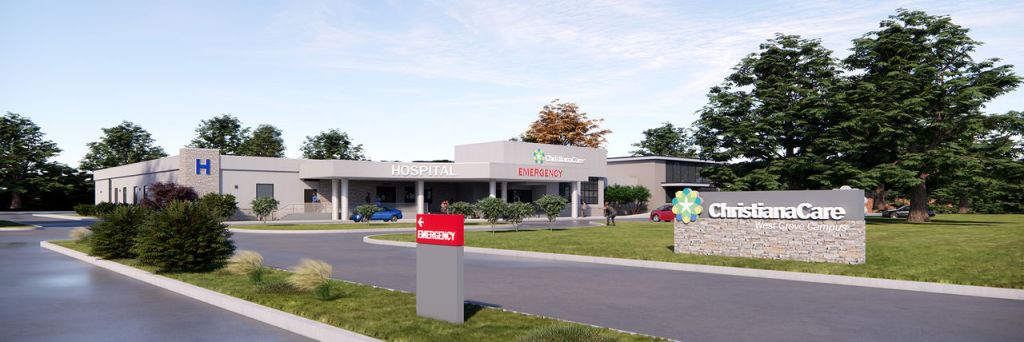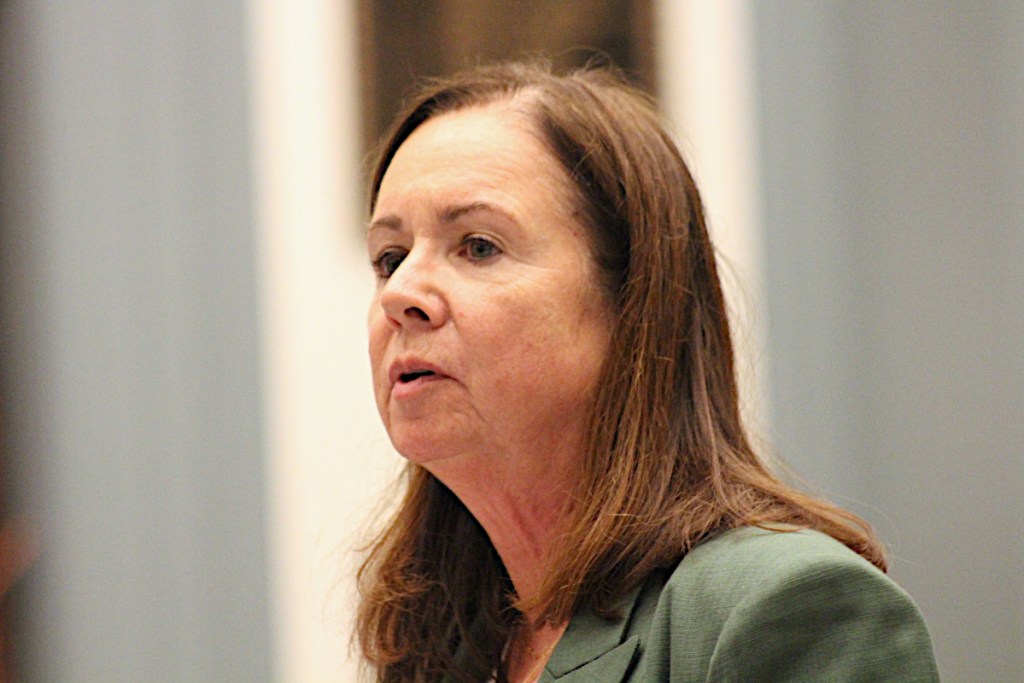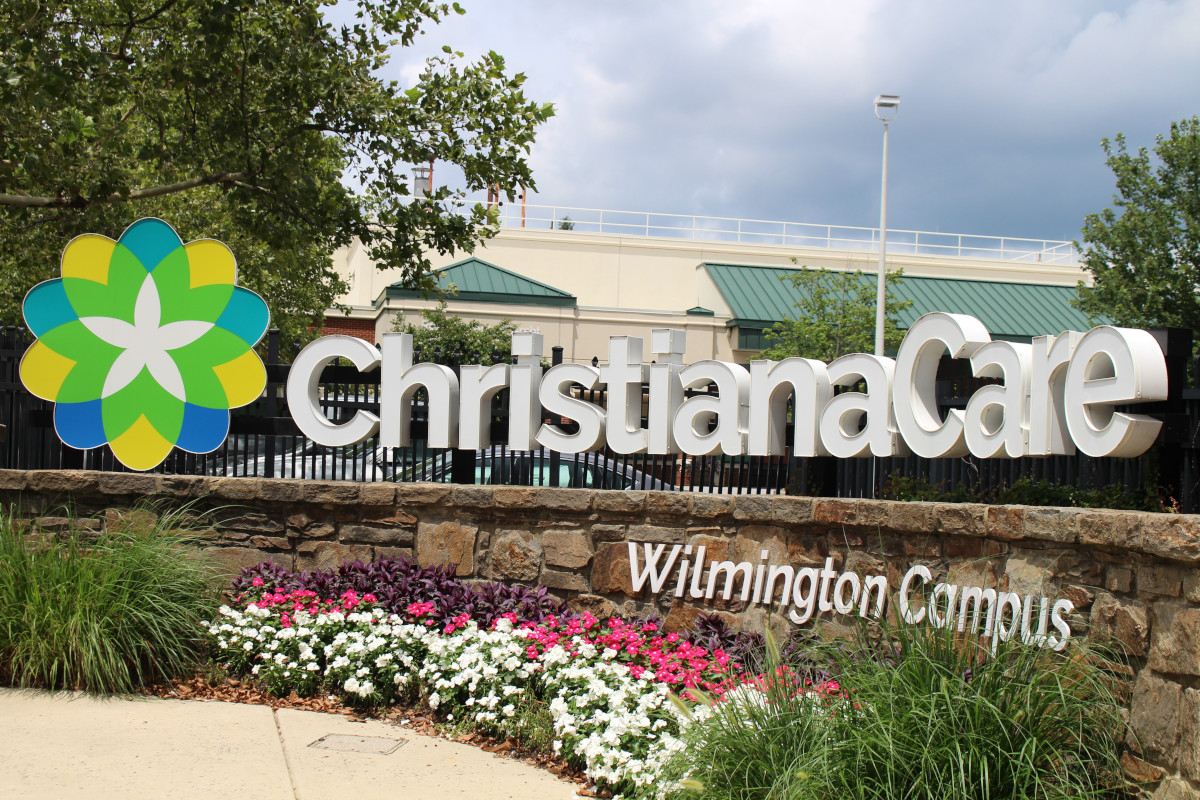Why Should Delaware Care?
The merger of Delaware’s largest health care system could impact pricing and access to care, as well as governance of the system that operates the two largest hospitals in the state. A regional organization could lead to less of a focus on Delaware.
ChristianaCare announced Wednesday morning that it is exploring a merger with Virtua Health, the largest health care provider in Southern New Jersey, in a deal that, if completed, would represent the most significant change to Delaware’s health care industry in decades.
The two not-for-profit health care systems have signed a non-binding letter of intent to consider co-founding a regional health system – a deal that could mean Delawareans would have less say over the future of its premier health care system.
An undefined period of due diligence, where the systems will study each other’s private financial data and market analyses, will now ensue to determine if the merger will ultimately be pursued.
Combining the current ChristianaCare and Virtua Health footprints would create a system covering more than 10 contiguous counties in New Jersey, Delaware, Pennsylvania and Maryland, with more than 600 facilities, nearly 30,000 employees and more than 500 residents and fellows.
The deal would require numerous regulatory sign-offs in both states, pitting potential hurdles to completing the deal. That includes a review of the deal by Delaware Attorney General Kathy Jennings and New Jersey Attorney General Matt Platkin.
Both health systems declined to make officials available for interviews on the possible merger. A press release announcing the deal was short of details.
“At a time of great uncertainty in health care … We are excited to take this bold step to double down on our mission, multiply our excellence and ensure our legacy of high-quality care in our local communities for generations to come,” ChristianaCare President & CEO Dr. Janice Nevin said in a statement.
For ChristianaCare, the largest health care system in Delaware and the state’s largest non-government employer with more than 13,000 employees, the deal represents the most ambitious transformation in its nearly 140-year history.
Born out of the merger of three independent hospitals in downtown Wilmington in 1965, the health system grew to open the leading Christiana Hospital in 1985. In the two decades afterward, it added a new emergency and trauma center, a women’s health wing, the Center for Heart & Vascular Health and the Helen F. Graham Cancer Center.
But in the last decade, ChristianaCare has looked outside its Delaware home for its future growth.
 In the last two years, ChristianaCare has embarked on plans to open three micro hospitals in Pennsylvania’s Chester and Delaware counties. | PHOTO COURTESY OF CHRISTIANACARE
In the last two years, ChristianaCare has embarked on plans to open three micro hospitals in Pennsylvania’s Chester and Delaware counties. | PHOTO COURTESY OF CHRISTIANACARE
The future is north
In 2020, ChristianaCare acquired Union Hospital in neighboring Elkton, Md., marking its first surgical facility outside the First State.
In 2022, it acquired the former Jennersville Hospital in Chester County, Pa., from Tower Health in an $8 million deal. It has since rebranded the site as the ChristianaCare West Grove Campus and plans to reopen the hospital that was closed for nearly two years next month.
Late last year, ChristianaCare further invested in Southeastern Pennsylvania by announcing plans to build two more “micro hospitals,” or those featuring just 10 inpatient beds, in Delaware County, Pa. Private equity-backed Emerus Health is co-developing the projects, the first of which is a $50 million micro hospital in Aston, Pa. The second site will be farther north in Springfield, Pa.
Then in May, ChristianaCare paid $50.4 million in a bankruptcy auction to acquire five Delaware County outpatient sites that were formerly operated by Crozer Health, a failed for-profit health system.
Finally, in further alignment north, ChristianaCare announced earlier this month that it has affiliated with the Children’s Hospital of Philadelphia, better known as CHOP. Beginning next year, patients at all ChristianaCare sites will have access to CHOP’s expertise in rare and complex diseases and a wide range of newborn and pediatric services.
In making that partnership, ChristianaCare notably passed over its well-regarded neighbor, Nemours Children’s Health. The Wilmington-based Nemours said in a statement that while it “had hoped to collaborate more closely with ChristianaCare, we respect its decision to engage an out-of-state provider.”
The significant growth of ChristianaCare’s footprint came largely after it abandoned plans to acquire Crozer Health in 2022. After six months of due diligence into the beleaguered health system’s finances and the market potential – a period that was marked by additional layoffs, program cuts and the sale of Crozer’s real estate – the Wilmington-based health care system decided to drop the approach.
ChristianaCare pursued its own vision for Philadelphia’s southern suburbs instead.
What Virtua offers
Virtua Health is a not-for-profit health care system that has roots dating back to 1880 in Southern New Jersey.
In 1998, the former Memorial Health Alliance and West Jersey Health System merged to create Virtua Health. Today, it is headquartered in Marlton, N.J., located about 12 miles east of Philadelphia in Burlington County.
It has hospitals in Marlton, Mount Holly and Voorhees, and in 2019 acquired the Lourdes Health System in New Jersey, adding hospitals in Camden and Willingboro. In total, Virtua has more than 1,400 inpatient beds across its footprint, led by Virtua Voorhees Hospital, which has nearly 600 beds alone. Virtua also has two freestanding emergency departments and 42 ambulatory surgery centers.
The health system has developed an academic affiliation with Rowan University, including opening the Virtua Health College of Medicine & Life Sciences of Rowan University. It also partners with Penn Medicine for cancer and neuroscience and CHOP for pediatrics.
Virtua has courted some controversy in recent years, having been sued by the state for discriminating against pregnant patients by subjecting them to mandatory drug testing without informed consent. That case was uncovered when a pregnant mother who had eaten a poppy seed bagel before her delivery tested positive for opioids, and was subjected to investigations by child protective services.
The system was also sued last year by employees for allegedly mismanaging its retirement funds by utilizing unnecessarily pricier options with its plan provider, Lincoln Financial Group, in order to allow it to reap outsized profits.
 The largest hospital in the Virtua Health system is Virtua Voorhees Hospital, which has more than 500 inpatient beds. | PHOTO COURTESY OF VIRTUA HEALTH
The largest hospital in the Virtua Health system is Virtua Voorhees Hospital, which has more than 500 inpatient beds. | PHOTO COURTESY OF VIRTUA HEALTH
Combination would create powerhouse
The merger of ChristianaCare and Virtua Health would create a new powerhouse in the region, drawing more than $6 billion in annual revenues.
And it would push the combo into the Top 50 largest revenue-producing health care systems in America, according to an annual ranking by Becker’s Hospital Review.
Even so, it would continue to be dwarfed by major regional competitors like Philadelphia-based Jefferson Health, which eclipsed $15 billion in revenue last year.
Both health systems enter the merger discussion with particular financial strength. According to 2024 audits, ChristianaCare ended the fiscal year with about $448.5 million in “excess revenue” – as a nonprofit, it is required to reinvest or save those funds rather than reward ownership with what the private sector would call profit – while Virtua ended the year with $285 million.
Both saw operating funds run in the black in both 2024 and 2023 after bouncing back from COVID-influenced slumps in 2022.
What would a merger mean?
At its simplest, a merger of ChristianaCare and Virtua would likely result in a new joint name for the regional organization as well as a combined board of directors. How many Delaware directors would remain on such a board remains to be seen, but Delawareans would assuredly have less say over the future of the organization.
Because the two health systems don’t currently share much of an operational footprint, significant consolidation of workforces is less likely. Mergers do typically result in slimmer executive rank staffs as organizations combine, and whether ChristianaCare CEO Nevin, Virtua Health President & CEO Dennis Pullin or someone else would lead the combined organization remains to be seen.
Nevin earned nearly $3 million in annual compensation while Pullin earned more than $3.4 million, according to 2023 tax records.
Decades of academic studies on hospital mergers have found that consolidation of providers often leads to higher costs for consumers.
Last year, a study by researchers from the University of Chicago, Yale, the University of Wisconsin, Harvard and the federal government found that service prices rose 1.2% on average within two years of a completed merger. It further found that those increases, when passed on to employers who have to cover workers’ health insurance, led to decreased payroll and employment of non-healthcare employers by about 0.4%.
While many mergers seek to stabilize uncertain fiscal outlooks, that does not appear to be the case here.
ChristianaCare and Virtua are carrying $455 million and nearly $95 million in cash or equivalents of hand, respectively, according to 2024 audits, and typically operate in the black each year.
While each system is carrying more than $1 billion in total liabilities, Virtua holds a much larger share of long-term debt: $563 million versus $329 million for ChristianaCare. Those bonds or loans require annual debt-servicing payments, and Virtua makes annual payments of more than $50 million while ChristianaCare’s most recent debt-servicing payment was just $7 million.
The Delaware system carries a much higher liability on pension and other post-employment benefits, totaling more than $196 million. Virtua had just $16 million.
 ChristianaCare is Delaware’s largest health care provider. | SPOTLIGHT DELAWARE PHOTO BY JACOB OWENS
ChristianaCare is Delaware’s largest health care provider. | SPOTLIGHT DELAWARE PHOTO BY JACOB OWENS
Doctors union has questions
Last year, hundreds of ChristianaCare acute care physicians became the first unionized health care providers in Delaware when they voted to join the Doctor’s Council, a branch of the Service Employees International Union.
ChristianaCare initially fought that unionization drive, but has ultimately come to the table to negotiate with union leaders, according to Trevor Bolden, the chief of staff at Doctors Council. He said they were notified earlier this week that the health care system would be announcing the merger plans.
“Our first reaction wasn’t despair, it was more curiosity,” he told Spotlight Delaware. “I don’t know if they’re trying to reduce their workforce in a certain area or if they’re trying to expand on their workforce. They really couldn’t give us any direct answers, and we found that a little unusual.”
Bolden said his union’s first concern is around job security for its members in the face of a merger, especially because Virtua Health currently does not have any unionized care providers.
“Our concern is that they’ll reorganize the current workforce, and that they’ll think they don’t need the same number of positions in those impacted areas,” he said. “Patients don’t want to hear from the administration when it comes to their health care. They want to hear from their physicians.”
 Dr. Janice Nevin, the president and CEO of ChristianaCare, was a vocal opponent of House Bill 350 and has been engaged with the lawsuit seeking to prevent its implementation. | SPOTLIGHT DELAWARE PHOTO BY JACOB OWENS
Dr. Janice Nevin, the president and CEO of ChristianaCare, was a vocal opponent of House Bill 350 and has been engaged with the lawsuit seeking to prevent its implementation. | SPOTLIGHT DELAWARE PHOTO BY JACOB OWENS
Deal comes amid challenging times
It’s clear that concerns over cuts to Medicaid and Medicare approved under the Trump administration’s One Big Beautiful Bill Act have played a part in ChristianaCare seeking to scale. While Virtua sees only about 20% of its patient revenue come in via the federally subsidized insurance programs, ChristianaCare has a much higher exposure – about 45% of its revenues come from those programs, split nearly in half, according to its audit.
Decreased coverage of at-risk populations could increase the potential that ChristianaCare loses reimbursement revenue from the programs or runs up additional costs on uninsured care.
George Foutrakis, chair of the ChristianaCare Health System Board, said in the announcement that, “Our vision for this new health system – when Medicare and Medicaid are facing cuts and many hospitals are struggling to stay open – gives me hope and excitement for our future and for the health of our neighbors.”
At home, ChristianaCare has also been at odds with the state legislature over the Diamond State Hospital Cost Review Board, an oversight body set up by former Gov. John Carney and state legislators last year to review and approve hospital spending. Delaware continues to see spending on health care far surpassing projections, making the cost of care in the state among the highest in the nation.
Hospital leaders vocally opposed the measure, saying rising costs of health care fell largely upon pharmaceutical pricing hikes, the cost of hiring in a competitive market and inflation falling on all industries. Their arguments largely fell on deaf ears though, as state Democrats pushed through the measures in order to open hospitals’ books and provide public assurances on their spending.
ChrisitianaCare sued the state over the review board, arguing that government oversight over its private board decision-making was unconstitutional. That argument survived an initial legal hurdle and will head to trial later this year.
Read more from Spotlight Delaware
